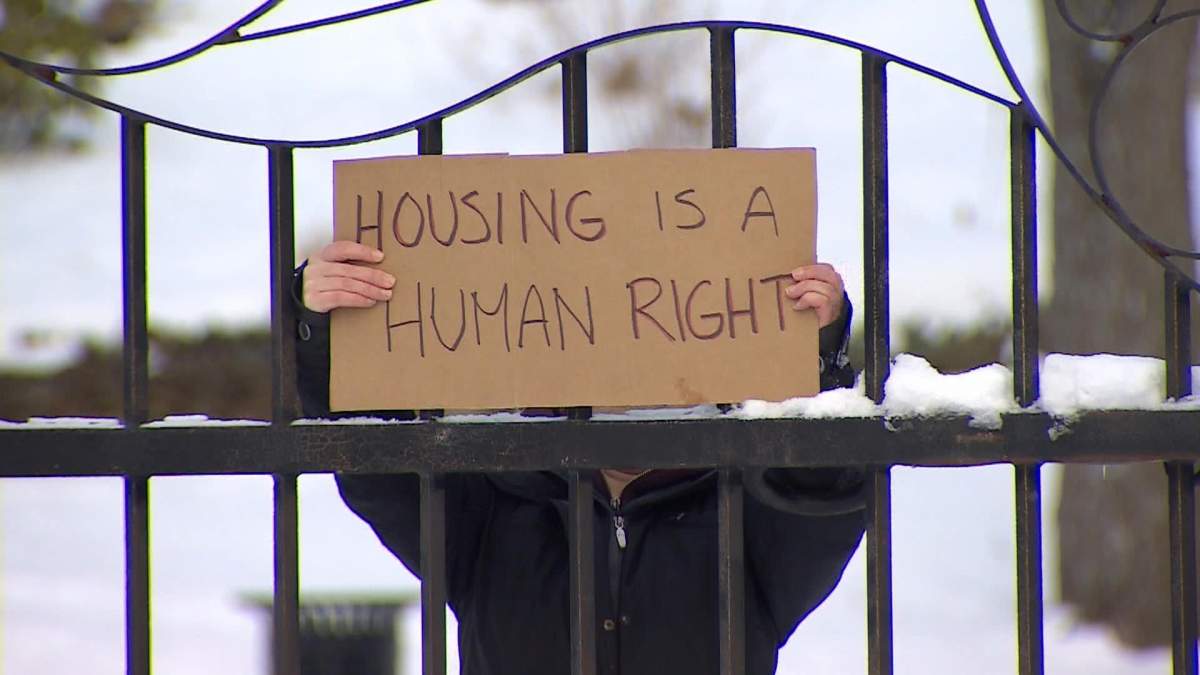Over the last week, two temporary structures have been placed in Dartmouth to provide those without shelter a place to sleep and stay protected from the elements.

The two structures that look like sheds were created by a group called Halifax Mutual Aid, which is made up of anonymous volunteers.
“This is not a long-term solution, but this is getting people out of the cold,” said Kevin, a member of Halifax Mutual Aid.
One of the current occupants is Andrew Goodsell. He says prior to this, he’d spent the last three months sleeping on the streets in downtown Halifax.
“It’s a lot better than getting rained on and just getting beat up by the elements,” he said of his new shelter.
On Monday a rally was held downtown to raise awareness of the issue and to protect the shelters after Halifax Mutual Aid says the municipality threatened to tear them down.
They’re aware the shelters may not be “up to code” but say it was time something was done, even if it’s just a band-aid solution.
“I’m not a social worker or housing expert but I’m somebody who is quite distraught at the level of crisis we’re in,” said Kevin.
For the past few years, Halifax has had a one per cent vacancy rate, and it’s led many housing experts to call it a housing crisis. Affordable housing is in high demand and there isn’t enough for everybody in need.

Get weekly health news
The issue has been exacerbated by COVID-19. With Nova Scotians being urged to stay at home, particularly in the earlier months of the pandemic, the numbers of those without a home became more clear.
In previous years, single-day counts of the homeless population were around 200 people, but when the count was completed on Oct. 9, the homeless population was 493.
“You can look back and see 10 years or more of city officials and provincial officials acknowledging the issue, but they haven’t made tangible action,” said Kevin.
“It’s just been promises and talk for decades. They have made some positive moves in the last month to use federal funding for I believe 45 units, and that’s encouraging, but that’s 45 units and they’re not going to come online in the spring.”
The new units that have been promised are a result of $1 billion announced by the federal government in October with the goal of creating 3,000 more affordable housing units across the country. With the $8.7 million given to Halifax Regional Municipality, council voted to support three rapid housing projects, which will result in 52 affordable units being created.
Still, councillors acknowledge addressing housing has been a challenge.
Sam Austin, the councillor for District 5, where the temporary shelters have popped up, says that while he understands the shelters are better than sleeping on the streets or in tents, creating these shelters without first consulting the municipality isn’t the way to go. But he says the city will not be tearing them down.
“Any shelter that’s occupied, we will not forcefully evict people,” said Austin.
“What we will do is try and work with people through our street navigator program to connect them with services so they can get help and get them off the street.”

But Austin also understands that may not be enough, and that the current level of service cannot alone adequately address the issue of homelessness.
“Rents have been going through the roof, no government has built any housing in basically 20 years and there’s a shortage of assistance for housing,” said Austin.
“Can anyone out there afford to keep a place on $600 a month? Because that’s what a single person on assistance gets in Nova Scotia and that’s so woefully inadequate.”
Austin says that, unfortunately, it’s an issue that goes above the municipality’s scope. While the municipality is still able to help by providing funding and support for various non-profits, after amalgamation over 20 years ago, housing became a provincial mandate.
“So much of what needs to do be done comes to the feet of the provincial government,” said Austin.
“They control assistance rates, they’re the ones who build and operate housing.”
Spokesperson for the Department of Municipal Affairs and Housing Krista Higdon declined an interview but said in an email statement that finding housing for those who needed it is a group effort.
“Recently the province invested an additional $1.7 million for 40 new shelter beds with our partners at the Mi’kmaw Native Friendship Centre, and the North End Community Health Centre,” Higdon said in the email.
“In addition to this investment, we are making the single largest investment to address homelessness in the province’s history. The Integrated Action Plan to Address Homelessness will invest more than $20 million over 5 years, and we’re already seeing positive results.”
Since June 2020, the province’s housing locator has accessed 140 units for those experiencing or at risk of homelessness, Higdon said.
“We’ve also had success finding housing for 647 individuals across the province through housing support workers working with not-for-profit and private sector landlords and developers since April 1.”









Comments
Want to discuss? Please read our Commenting Policy first.